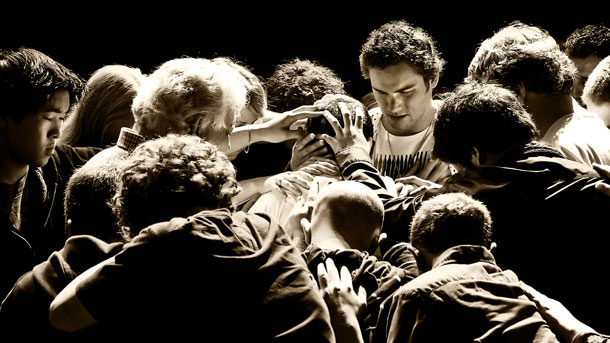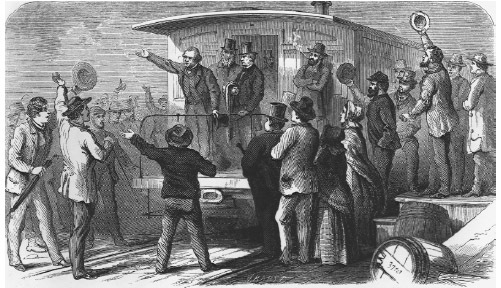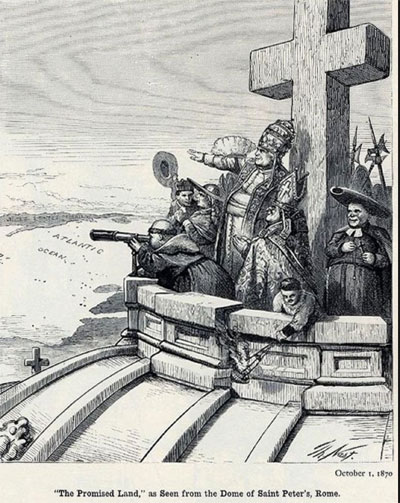
To the elders among you, I appeal as a fellow elder and a witness of Christ’s sufferings who also will share in the glory to be revealed: 2 Be shepherds of God’s flock that is under your care, watching over them-not because you must, but because you are willing, as God wants you to be; not pursuing dishonest gain, but eager to serve; 3 not lording it over those entrusted to you, but being examples to the flock. 4 And when the Chief Shepherd appears, you will receive the crown of glory that will never fade away. 1 Peter 5:1-4
It is my belief that one of the things lacking in the Church today is the sense of eldership, not just from the clergy, but from the laity.
There are few passages of Scripture that more clearly show the importance of eldership in the Church than this periscope from 1 Peter. It is to the elders that Peter is writing to, and he does not hesitate to call himself a fellow-elder. To fully understand this concept of elder it will be helpful to gain a better understanding of the background and history of this important office in the Church. I will preface this by saying that the elders should be chosen from the most worthy of people in the Church and not just because they are willing to serve. They need to understand the importance of this role and, like the clergy, need to live spiritual lives that set the example for those they have been chosen to lead.
Jewish Background
Eldership has a Jewish background. The Jews traced the beginning of eldership to the days when the children of Israel were on their journey through the wilderness on their way to the Promised Land. Moses felt that the burdens of leadership were too much for one person to bear and so seventy elders were chosen and set apart to share in the administration (Number 11:16-30). After this elder became a permanent part of Jewish life. They are friends of the prophets (2 Kings 6:32); as the advisers of kings (1 Kings 20:8;21); as the colleagues of the princes in the administration of the affairs of the nation (Ezra 10:8). Every village had elders at the gate to distribute justice to the citizens (Deuteronomy 25:7). The elders were the administrators of the synagogue; they did not preach, but they saw to the good government and order of the holy place, and they exercised discipline over the members. The elders would have formed a large section of the Sanhedrin, which was the supreme court of the Jews. In the Book of Revelation, we see in the heavenly places twenty-four elders around the throne. As we have seen elders were woven into every aspect of Jewish life, civil and religious.
Greek Background
Eldership has a Greek background. Elders in the Egyptian communities handled the conduct of public affairs, but life our city councils are today. Women who had suffered assault will appeal to the elders for relief and justice. They handled the issuing of public edicts, leasing land for pasture, and for taxation. Even in the pagan communities elders are found who handled discipline.
What is apparent is that long before Christianity took it over elder was a title of honor both in the Jewish and the Greco-Roman World.
Christian Background
In every community that Paul went to it was his custom to ordain elders to run things for him. On the first missionary journey, elders were appointed in every church (Acts 14:23). Titus is left in Crete to appoint elders in every city (Titus 1:5). The elders had charge of the financial administration of the Church; it is to them that Paul and Barnabas delivered the money sent to relieve the poor of Jerusalem in the time of famine (Acts 11:30). The elders were councilors and the administrators of the Church. They can be found taking a leading role in the Council of Jerusalem when it was decided to open the doors of the Church to Gentiles. At this council, the elders and apostles are spoken of together as chief authorities in the Church (Acts 15:2, 16:4).
When Paul came on his last visit to Jerusalem, it was to the elders that he reported, and they suggested the course of action he should follow (Acts 21:18-25). One of the most moving passages in the New Testament is Paul’s farewell to the elders of Ephesus. Paul sees the elders in Ephesus as overseers of the flock of God and the defenders of the faith (Acts 20:28-29). In the Letter of James, the elders had a healing function in the Church through prayers and the anointing with oil (James 5:14). In the Pastoral Epistles, the elders were rulers and teachers, and by the time of the letter they were paid officials (1 Timothy 5:17).
When a person enters into eldership in the Church, no small honor is conferred upon them, and they should remember that they are entering into the oldest religious office in the world with a history that can be traced to Christianity and Judaism for four thousand years; and no small responsibility falls to them for they have been entrusted with being a shepherd of the flock of God and a defender of the faith.
Today’s Challenges
One of the greatest challenges of the Church in the 21st century is leadership both clergy and lay, but the laity will play a much larger role as more and more churches move to part-time (or tent making) pastorates. The words of Peter are important for us to think about as we think about leadership in the Church.
The Perils and the Privileges of Eldership
Leadership in the Church is a mission and a ministry and needs to be looked at that way. A person should not be elected, or selected, to serve in leadership just because they are popular and will gain the most votes. The life and example of the leader are essential in their role as they will set the example of those that will follow. It’s not just about passing the budget it is about leading the entire church both spiritual and physical.
In the passage quoted above, Peter sets down in a series of contrasts the perils and the privileges of eldership. What he points out is applicable not only to eldership abut also to all Christian service inside and outside of the Church.
The elder is to accept the office, not under coercion, but willingly. This does not mean that one should seek or grasp after the office or enter it without self-examining thought. Any is Christian should have a certain reluctance to accept high office because they should be aware of their unworthiness for that office. Peter does not say that a person should be conceitedly or irresponsibly eager for office; but that every Christian should be anxious to render such service as they can, although fully aware of how unworthy they are to render it.
The elder is to accept the office, not to be a petty tyrant, but to be the shepherd and example of the flock. Human nature is such that for many people prestige and power are even more attractive than money. There are those who love authority, even if it is to be exercised in a narrow sphere. The significant characteristic of the shepherd is his selfless care and sacrificial love for the sheep. Anyone who enters office with the desire for pre-eminence has got the whole point of view upside down. Jesus said to his ambitious disciples, “You know that those who are supposed to rule over the Gentiles lord it over them, and their great men exercise authority over them. But is shall not be so among you; but whoever would be great among you must be your servant, and whoever would be first among you must be a slave of all” (Mark 10:42-44).
One of the interesting phrases in this passage is the phrase “petty tyrants over those allotted to your care.” This phrase that has been translated “those allotted” is curious in Greek; it is ton kleron, the genitive plural of kleros that is a word of extraordinary interest.
It begins by meaning dice or lot. It is used this way in Matthew 27:35 telling how the soldiers beneath the Cross were throwing dice to see who should possess the seamless robe of Jesus.
Second, it means an office gained or assigned by lot. It is the word used in Acts 1:26 telling how the disciples cast lots to see who should inherit the office of Judas.
It then comes to mean an inheritance allotted to someone, as used in Colossians 1:12 for the inheritance of the saints.
In classical Greek, it very often means a public allotment or an estate of land. The civic authorities distributed These allotments to the citizens, and very often the distribution was made by drawing lots for the various pieces of land available for distribution.
Even if we go no further than this, it would mean that the office of eldership and, indeed, any piece of service offered to us is never earned by any merit of our own but always allotted to us by God. It is never something that we have deserved but always something given to us by the grace of God.
What an idea. What a condemnation. It is our task to show to people God’s forbearance, his forgiveness, his seeking love, his illimitable service. God has allotted to us a task, and we must do it as he would do it. That is the supreme ideal of service in the Christian Church.
One of the lovely things about this passage is Peter’s attitude throughout it. He begins by taking his place beside those to whom he speaks. “Your fellow-elder” he calls himself. He does not separate himself from them but comes to share the Christian problems and the Christian experience with them. But there is one difference; he has memories of Jesus and these memories of his color this entire passage.
Peter describes himself as a witness to the sufferings of Christ. Although we may think that since Peter denied Christ he was not, in fact, a witness to his sufferings but he followed Jesus into the courtyard of the High Priest’s house and it was there that, in a time of weakness, he denied the Master. After the trial was over, and they were leaving Jesus out, we come to see one of the saddest verses in all of Scripture: “And the Lord turned and looked at Peter… and Peter went out and wept bitterly” (Luke 22L61-62). In the one look, Peter saw the suffering of the heart of a leader whose follower had failed him in the hour of his bitterest need. Peter is the witness of the suffering that comes to Christ when we deny him, and that is why he was so eager that his people might be staunch in loyalty and faithful in service.
He describes himself as a sharer in the glory that is going to be revealed. This statement looks back and forwards at the same time. Peter had a glimpse of that glory during the Transfiguration. But he also knew there was glory to come, for Jesus had promised his disciples a share in his glory when he comes to sit on the throne.
There can be no doubt that when Peter speaks of shepherding the flock of God, he remembers the task that Jesus had given him when he had told him to feed his sheep (John 21:15-17). The reward of love was the appointment as a shepherd, and Peter is remembering it.
When Peter speaks of Jesus as the Chief Shepherd, many memories must have filled his mind. Jesus compared himself to the shepherd who sought at the peril of his life the lost sheep (Matthew 18:12-14; Luke 15:4-7). He had sent out his disciples to gather the lost sheep of the house of Israel (Matthew 10:6). He was moved with pity for the crowds, for they were without a shepherd (Matthew 9:36; Mark 6:34).
Above all of this he compared himself to the Good Shepherd, who was ready to lay down his life for the sheep (John 10:1-18). The picture of Jesus as the Shepherd was a precious one, and the privilege of being a shepherd of the flock of Christ was for Peter the greatest opportunity that a servant of Christ could have.









